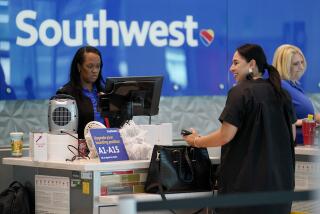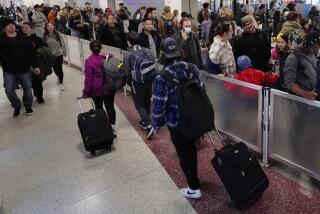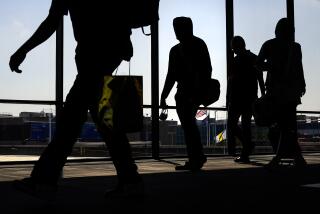Rebound in Travel, Shipping Seen, but Going May Be Slow
- Share via
With an end to the Gulf War imminent, international commerce--notably air travel and shipping--is beginning to show signs of life, though the recession and concerns about terrorism are expected to stifle a full-fledged recovery.
Executives at airlines, hotels and travel agencies say that bookings are up slightly, largely because of hefty air fare discounts. One hotel chain said reservations surged 25% earlier this month after America West Airlines offered half-price tickets in a three-day sale.
British Airways, meanwhile, said that it was reviving transatlantic Concorde flights. And insurance premiums for shipping cargo continued to tumble as rate-setters in London concluded that the threat to commercial shipping was subsiding.
“Travel is starting to pick up again,” said Jill Collins, spokeswoman for the U.S. Department of Commerce. “When the war started, people were frozen in place. Now, people are saying life goes on and it is time to get going again.”
A Commerce Department survey this week of tour operators abroad shows a growing optimism about travel, she said. Of tour operators surveyed, 61% thought the United States was safer than other destinations. Two weeks ago, only 28% thought so.
The department also asked if tour operators expected travel to increase. More than 40% said yes, compared to only 4% two weeks earlier.
“We are seeing the tip of the iceberg,” said Michael A. Ribero, senior vice president of marketing at Hilton Hotels, whose bookings jumped during the America West sale. “People are more comfortable with the fact that the war will be over in a short time.”
Nonetheless, few travel industry executives expect a quick rebound in travel, despite the new optimism. Fears about such terrorist acts as the recent bombing of London’s Victoria Station by the Irish Republican Army aren’t likely to immediately end with the war.
Moreover, a continued economic recession is expected to put a crimp in travel even after fighting in the Gulf stops.
Industry executives believe they will have to dangle incentives in front of consumers to get them traveling again. Hilton already plans a special discount for frequent customers timed to the war’s end. And a coalition of airlines, hotels and travel agencies agreed Monday to kick in $8 million for an advertising campaign to promote travel.
Despite such efforts, Jeffrey Kreindler, vice president at Pan American World Airways, predicted the industry will recover from the war slowly.
“At a turtle’s pace,” he said.
A prolonged dip in travel leaves the survival of some airlines in doubt. Two airlines--Pan Am and Continental--are in bankruptcy proceedings, and several others face cash flow problems. Trans World Airlines, for example, has suspended interest payments to its bondholders.
“Collectively, the industry is going to lose money in the first quarter, and the second quarter is not looking that good,” said John Hotard, spokesman for American Airlines, one of the nation’s healthiest.
Tsuneo Fujiwara, general manager for All Nippon Airways in the western United States, said the industry was nervous that the recession and terrorist-related fears would extend the travel slump into the important summer travel season. “That is what has us worried,” he said.
Worries about terrorism also are lingering among insurance carriers.
Peter Hubert, chairman of the Lloyd’s of London Aviation Underwriters Assn., said “airlines are prime targets.” Airlines from countries in the coalition forces are expected to pay higher than normal premiums for some time “unless it becomes clear that there isn’t going to be a backlash . . .
“For the immediate future--and I mean weeks and months, not years--I see those rates continuing.”
Hubert said he personally believes the level of terrorist threat hinges on whether supporters of Iraqi President Saddam Hussein view the Iraqi defeat as honorable or as a humiliation.
Experts on terrorism agreed that a humiliation of Hussein might trigger terrorist acts.
“I don’t think the threat is past,” said Bruce Hoffman, terrorism expert at Rand Corp. in Santa Monica.
“That is not to say it is unsafe to travel,” added Hoffman, interviewed by telephone from the airport in Norfolk, Va. “Thousands travel each day and nothing happens.”
Frank Maguire, editor of Security Intelligence Report, a Washington-based newsletter, said stepped up airport security ordered by the Federal Aviation Administration to stop terrorists actually may have scared some travelers.
Intensified precautions--including bigger security forces, more hand searches of baggage and parking restrictions--may have reassured some fliers. But Maguire says such measures also “conveyed to the public that something terrible was about to happen,” he said.
An FAA spokesman said the heightened security measures won’t necessarily end when the war is over. “We will make a judgment on whether the increased terrorist threat is still there at the time,” said spokesman Fred Farrar.
One nagging problem for the travel industry is the recession. The hotel business had said before the war that bookings were flat from a year earlier. The airline industry says that more than half of the 5%-to-8% decline in domestic travel in February was caused by the recession.
Travel executives say they are counting on optimism about the war’s end to lift the nation’s economic mood. “One of the factors behind the recession was uncertainty about the war,” said Hilton’s Ribero.
Meanwhile, the situation in the cargo industry eased Wednesday as war-risk insurance premiums for vessels operating in the Persian Gulf extended their slide.
Some premiums touched levels not seen since before the Aug. 2 invasion of Kuwait, as the rout of Iraq’s military gathered momentum and the threat to commercial shipping continued to subside.
“The market is breathing a big sigh of relief,” said Stephen Merrett, chairman of the Merrett Syndicate at Lloyd’s.
Cargo insurance rates are regularly set by the War Risks Rating Committee, a joint body of Lloyd’s and the Institute of London Underwriters. After shooting as high as 2% of the value of a ship’s cargo near the Jan. 15 deadline for Iraq’s withdrawal from Kuwait, premiums have fallen back to 0.0275%, Merrett said. With the end of hostilities apparently close at hand, charter rates for crude oil-carrying supertankers were also in retreat. Supertankers--those capable of storing or hauling approximately 2 million barrels of oil--could be chartered for $30,000 a day on Wednesday, down from $36,000 as recently as Monday.
“The thinking is that Iran and Saudi Arabia will begin to empty the 30 to 50 vessels they had chartered for floating storage,” said an official of a big U.S. tanker operator. That would return a large number of ships to the market.
Staff writer Victor Zonana in New York and correspondent Jeff Kaye in London contributed to this report.
More to Read
Inside the business of entertainment
The Wide Shot brings you news, analysis and insights on everything from streaming wars to production — and what it all means for the future.
You may occasionally receive promotional content from the Los Angeles Times.










